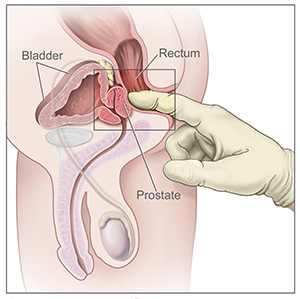Prostate Cancer Screening

Prostate cancer is highly treatable when caught early. That’s why regular screening is important. Screening checks for cancer when there are no signs or symptoms.
At the OHSU Knight Cancer Institute, we use blood tests and physical tests to look for prostate cancer.
Who should get prostate cancer screening?
Your doctor may suggest screening if you are:
- 55 to 69 years old.
- 40 or older and have one or more risk factors.
Anyone with a prostate has some risk. Learn more about risk factors on our prostate cancer signs and symptoms page.
Prostate cancer screening tests
PSA test
This test uses a small sample of your blood. It’s tested for PSA, a protein made by the prostate.
PSA levels are often high in people with prostate cancer. PSA levels can also increase as you age or if you have inflammation or an infection.
We recommend PSA testing. We also offer other blood tests to detect prostate cancer.
Digital rectal exam

In this test, a doctor briefly puts a gloved finger in your rectum to feel for lumps that could be early signs of cancer.
Genetic tests
Some people have inherited gene changes that put them at higher risk for prostate cancer. Our Prostate Cancer Genetics Clinic can provide testing. Our genetic counselors can help explain the results.
Learn more
- Prostate Cancer Screening – Patient Version, National Cancer Institute
- Screening Tests for Prostate Cancer, American Cancer Society
- Screening for Prostate Cancer, Prostate Cancer Foundation
- Should I Get Screened for Prostate Cancer?, CDC
For patients
Call 503-494-7999 to:
- Request an appointment
- Seek a second opinion
- Ask questions
Location
Knight Cancer Institute, South Waterfront
Center for Health & Healing, Building 2
3485 S. Bond Ave.
Portland, OR 97239
Free parking for patients and visitors
Refer a patient
- Refer your patient to OHSU.
- Call 503-494-4567 to seek provider-to-provider advice.
Cancer clinical trials
Clinical trials allow patients to try a new test or treatment.
Read more
Learn more about OHSU Knight Cancer Institute treatments: